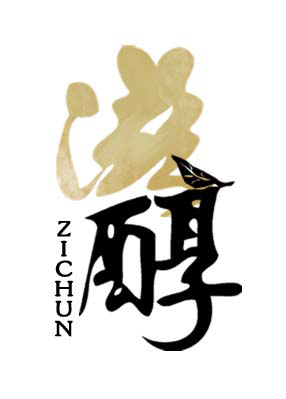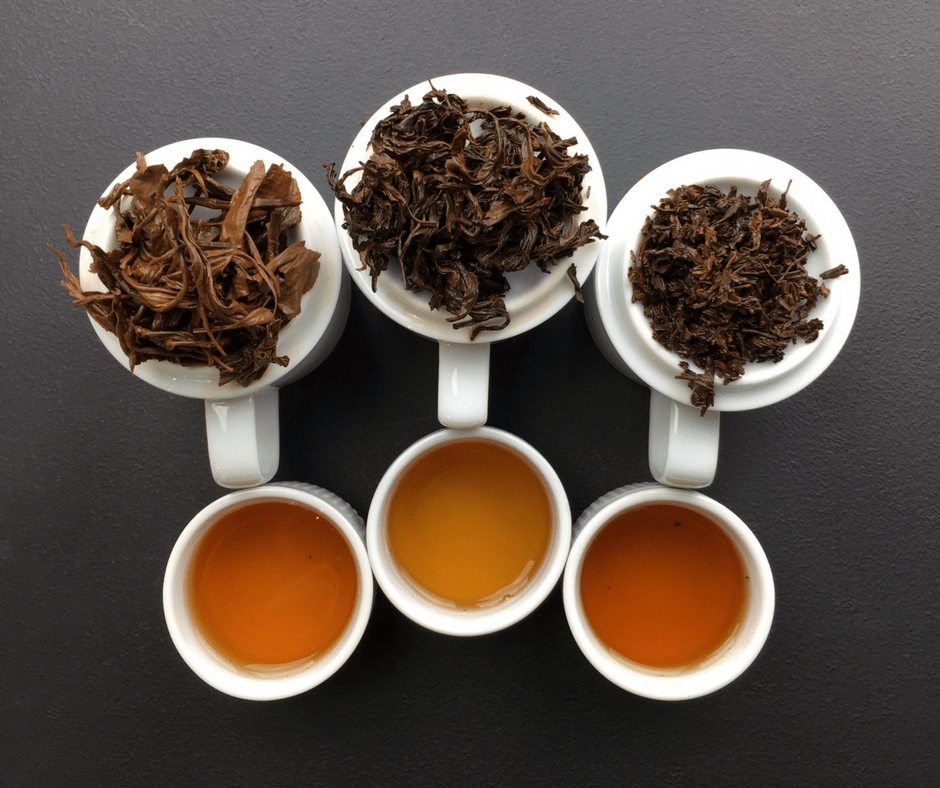News Articles/Blog Posts
6 reasons why Specialty Teas are becoming key revenue drivers for retail and wholesale tea shops
1. Consumers are wanting more! Specialty tea in the US is growing at the rate of 7 – 10% per annum – the highest of any segment of the tea industry

Increased tea education and public awareness of specialty teas are the main drivers creating the demand and interest. People are drinking more premium loose-leaf teas, not only for the many health benefits associated with tea, but also because they are realizing there are so many wonderful taste and flavor profiles that can be discovered and enjoyed – often being likened to fine wines with its many and varied nuances and flavors.
“I think it’s very likely that as demand for tea and specifically, specialty tea, continues to grow we cannot rely on, nor will we be wholly satisfied with, the same teas from the same places” – Jordan G. Hardin – Editor in Chief World of Tea (excerpt from https://specialtyteaalliance.org/world-of-tea/2018-tea-outlook/)
2. Consumers are demanding more traceability, sustainability and “naturalness” in their teas – which is more readily available with specialty teas

Tea shops providing specialty teas with unique stories, that can be traced to the source and have minimal impact on the environment, offer much more value and satisfaction for the consumer. There is more demand for foods and drinks that are natural, unrefined and “less processed”. Consumers are targeting products that are in their most natural, original form, such as specialty teas, for health benefits, instead of supplements and nutraceuticals.
“Consumers are becoming more engaged with their teas and want to learn more and more about where their teas come from; how they are harvested and manufactured; how the product supports the livelihoods of those making it; and, how friendly the product is to the environment.” – Peter F. Goggi, Tea Assoc. of the U.S.A., Inc (ex. from http://www.teausa.com/14654/state-of-the-industry)
3. The fast-growing wellness and health conscious consumers are buying more specialty teas
 There continues to be a strong focus in the market-place for foods and beverages with functional benefits and naturally healthy offerings. Many consumers understand the functional health benefits of tea and are reaching for specialty teas to meet these needs.
There continues to be a strong focus in the market-place for foods and beverages with functional benefits and naturally healthy offerings. Many consumers understand the functional health benefits of tea and are reaching for specialty teas to meet these needs.
“The linkage between tea and its healthful properties remains fundamentally strong. Specialty Tea is still driving interest and consumption in the category. Consumers across all demographics continue their “grazing” for new and different beverage options and flavors, further underscoring specialty tea’s unique position for further growth. The interest in terroirs, flavors, origins, bush to brand and sustainability of these high quality, higher priced teas confirms that the analogy to wine is stronger than ever. While on a smaller base, specialty teas continue to enjoy high single/low double-digit growth” Peter F. Goggi, Tea Association of the U.S.A., Inc (excerpt from http://www.teausa.com/14654/state-of-the-industry)
4. Positions you and your brand as an expert and an authority
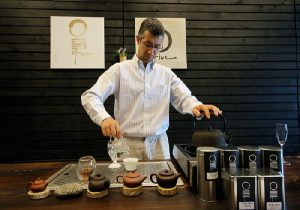 Research has shown that businesses carrying a high-end, expensive range of products in a particular field are automatically seen as having more expertise and more specialized knowledge compared to those that market primarily low-end, low-cost products. It automatically positions you as a more respected and credible authority. As a result, consumers tend to trust more and consequently buy more. Adding a range of high end specialty teas to your offerings and gathering some knowledge about them can significantly change your positioning in the market place and give you a competitive edge over the “same old tea sellers”. The more you can educate your customers and interest them in some fascinating tea stories the more they will buy from you
Research has shown that businesses carrying a high-end, expensive range of products in a particular field are automatically seen as having more expertise and more specialized knowledge compared to those that market primarily low-end, low-cost products. It automatically positions you as a more respected and credible authority. As a result, consumers tend to trust more and consequently buy more. Adding a range of high end specialty teas to your offerings and gathering some knowledge about them can significantly change your positioning in the market place and give you a competitive edge over the “same old tea sellers”. The more you can educate your customers and interest them in some fascinating tea stories the more they will buy from you
5. Good profit margins and ROI for specialty teas
 Although specialty teas cost more to purchase from suppliers, they can be packaged in smaller sized retail packages and carry a considerably higher price tag. Consumers tend to appreciate and value a quality product and/or a recognised brand over a cheaper version and are happy to pay more, knowing they will be getting good value for their money – and this certainly applies to specialty teas. There is also usually a lower rate of returns meaning more satisfied customer
Although specialty teas cost more to purchase from suppliers, they can be packaged in smaller sized retail packages and carry a considerably higher price tag. Consumers tend to appreciate and value a quality product and/or a recognised brand over a cheaper version and are happy to pay more, knowing they will be getting good value for their money – and this certainly applies to specialty teas. There is also usually a lower rate of returns meaning more satisfied customer
6. More regular customers creates a bigger and more stable customer base
 The rate of loyal returning customers tends to be higher for specialty tea buyers than for average or lower priced tea buyers. Once consumers find a good tea they are more likely to return and buy more, remain loyal, happy and give positive reviews. Happy customers generate credibility, trust and loyalty that builds repeat sales. And they talk about it! Positive referrals and recommendations about a product or brand are worth their weight in gold. Specialty teas that have an outstanding flavor and taste profile (as most do) are noticeably different and can create a real buzz and hype and plenty of positive talk amongst customers about your brand and products.
The rate of loyal returning customers tends to be higher for specialty tea buyers than for average or lower priced tea buyers. Once consumers find a good tea they are more likely to return and buy more, remain loyal, happy and give positive reviews. Happy customers generate credibility, trust and loyalty that builds repeat sales. And they talk about it! Positive referrals and recommendations about a product or brand are worth their weight in gold. Specialty teas that have an outstanding flavor and taste profile (as most do) are noticeably different and can create a real buzz and hype and plenty of positive talk amongst customers about your brand and products.
Tea is a multi-billion dollar industry and continuing to grow
The tea industry is continuing to grow and expand both within the US and globally. The estimated value of the tea industry in the US last year was $12.5 billion and continues to increase annually.
“The industry anticipates strong, continuous growth, with a CAGR (Compound annual growth rate) of 3-5%. This growth will come from all segments driven by variety, convenience, health benefits, sustainability, availability, continued innovation and the discovery of unique, flavorful and high-end specialty tea. Long term success relies on the continued adoption of tea by new consumers who continually seek healthy food and beverage choices.” Peter F. Goggi, Tea Association of the U.S.A., Inc (excerpt from http://www.teausa.com/14654/state-of-the-industry)
Estimated value of the United States tea industry
 (courtesy of http://www.teausa.com)
(courtesy of http://www.teausa.com)
- The US continues to be one of the top 3 tea importing countries worldwide with 279 million pounds imported during 2017
- Tea is the most widely consumed beverage in the world next to water and can be found in almost 80% of all U.S. households.
- In 2017, Americans consumed over 84 billion servings of tea, or more than 3.8 billion gallons. (Globally the figure was approximately 70 billion gallons with approximately 25,000 cups every second)
- About 86% of all tea consumed was black tea, 13% was green Tea, and the small remaining amount were oolong, white and dark tea
- Approximately four in five consumers drink tea, with millennials being the most likely (87% of millennials drink tea)
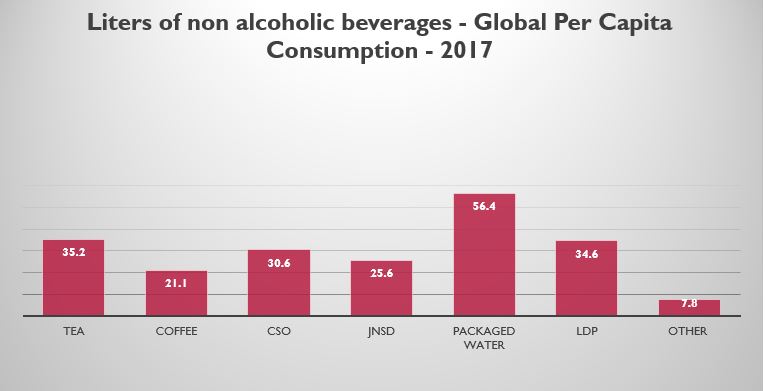 Globally humans drink 1.5 trillion liters of non-alcohol beverages (excluding tap water) On average, healthy individuals drink between 1.5 liters and 2 liters of liquids per day, of which 20 percent is from foods. On average, people have 48 beverage occasions per week. Tea accounts for nearly 10 (9.6) of this, while coffee (3.9) and carbonated soda (4.6) are less by half. Juices globally account for a 3.5 and dairy 3.2 share. Bulk water has a 3.7 share and individually packaged water has a 1.3 share that is rising, according to Nanda Kishore Banda, Middle East Trade Marketing Manager for Coca-Cola. (courtesy of http://worldteanews.com/news/tea-consumption-second-only-to-packaged-water ) JNSD = Juices, Nectars, Still Drinks : LDP = Liquid Dairy Products : CSO = Carbonated Soda Drinks
Globally humans drink 1.5 trillion liters of non-alcohol beverages (excluding tap water) On average, healthy individuals drink between 1.5 liters and 2 liters of liquids per day, of which 20 percent is from foods. On average, people have 48 beverage occasions per week. Tea accounts for nearly 10 (9.6) of this, while coffee (3.9) and carbonated soda (4.6) are less by half. Juices globally account for a 3.5 and dairy 3.2 share. Bulk water has a 3.7 share and individually packaged water has a 1.3 share that is rising, according to Nanda Kishore Banda, Middle East Trade Marketing Manager for Coca-Cola. (courtesy of http://worldteanews.com/news/tea-consumption-second-only-to-packaged-water ) JNSD = Juices, Nectars, Still Drinks : LDP = Liquid Dairy Products : CSO = Carbonated Soda Drinks
Some specialty teas issues facing retail and wholesale tea businesses
- Specialty teas and premium quality teas are lacking in clearly defined standards across the industry (although standardising is underway – see https://specialtyteaassociation.org/manifesto )
- Specialty teas not readily available from many of the mainstream tea suppliers and vendors
- Consumers buying specialty teas often seek out latest harvests, so having access to new season’s teas and a having a well-planned inventory so as to not have excess stock of old season’s teas is important
- Staff lacking in tea education and a lack of information on specialty teas supplied by vendors
What to look for in a good specialty tea supplier
- Able to supply small minimum order quantities – the purchasing price per kg is higher and being able to maintain a smaller inventory than lower priced, bigger volume teas is important
- Able to supply fresh batches and latest harvests within reasonable time after harvesting
- Able to maintain consistent quality with similar taste and flavor profiles (although as tea is an agricultural product there will always be some variation from season to season and batch to batch)
- Able to provide adequate tea information and traceability details
- Good channel of communications and in close proximity to the tea growers – minimum “leaf to cup” time
- Provides solid support and has an understanding of your business model and is able to offer and recommend suitable new teas as they become available
Here are the 10 top selling specialty teas currently offered at Zi Chun Tea Company
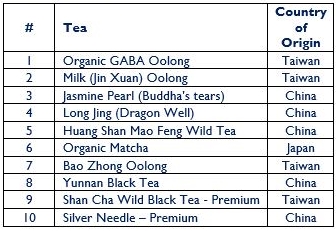 Zi Chun Tea Company is a lean, flexible, easy to work with, tea importing company that has grown steadily over the past 10 -12 years and is now shipping premium specialty teas to wholesale clients in over 15 countries.
Zi Chun Tea Company is a lean, flexible, easy to work with, tea importing company that has grown steadily over the past 10 -12 years and is now shipping premium specialty teas to wholesale clients in over 15 countries.
Our strong client-based focus and willingness to do whatever is needed to meet our customers’ needs is what has set us apart from many of the standard tea vendors and has given us excellent rapport with our customers – many of whom have been with us since our beginning.
Our unique, non-mainstream, business model of minimizing “leaf to cup” time by supplying fresh teas direct from the tea gardens, rather than via the long route of various warehouse and storage facilities, is very appealing to our clients.
Our administration head office is located in Australia and provides our customers worldwide with professional, dependable communications and business transactions. Our on the ground teams in Taiwan, China, India, Japan and Thailand are tea growers and tea makers with specialty tea expertise. They are in touch with a vast network of tea farmers and are set up to provide professional packaging and door to door shipping services. All of this has given Zi Chun Tea the outstanding reputation that it has today and positioned it as a leading specialty tea supplier.
Article written by Peter Wescombe
